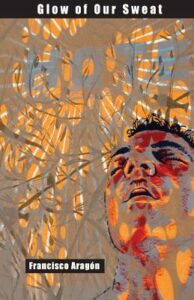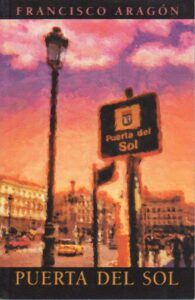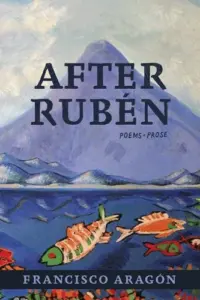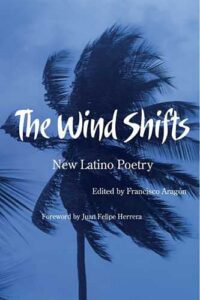Francisco Aragón
Asleep You Become a Continent
It is an intimate thing, to watch a lover while they sleep. In Francisco Aragón’s translation of Francisco X. Alarcón’s homoerotic poem, “Asleep You Become a Continent,” a man views his sleeping lover’s body like it’s a landscape: legs underneath sheets become mountains and valleys. The waking lover describes this view like an explorer might an unknown country; wondering what he will find.
We’re pleased to offer Francisco Aragón’s translation, and invite you to read Pádraig’s weekly Poetry Unbound Substack, read the Poetry Unbound book, or listen back to all our episodes.

Image by Annisa Hale/ Film processed by Moody's Film Lab, © All Rights Reserved.
Guests

Francisco X. Alarcón was an award-winning Chicano poet and educator. He authored fourteen volumes of poetry, published seven books for children, and taught at the University of California, Davis, where he directed the Spanish for Native Speakers Program. Photo by Christine Krikliwy, (c) 2008 Arizona Board of Regents. Courtesy of The University of Arizona Poetry Center.

Francisco Aragón is the son of Nicaraguan immigrants. His books include After Rubén (Red Hen Press, 2020), Glow of Our Sweat (Scapegoat Press, 2010), and Puerta del Sol (Bilingual Review Press, 2005). He’s also the editor of The Wind Shifts: New Latino Poetry (University of Arizona Press, 2007). A native of San Francisco, CA, he is on the faculty of the University of Notre Dame’s Institute for Latino Studies, where he directs their literary initiative, Letras Latinas. His work has appeared in over twenty anthologies and various literary journals. He has read his work widely, including at universities, bookstores, art galleries, the Dodge Poetry Festival, and the Split This Rock Poetry Festival. He divides his time between South Bend, IN, and Mililani, HI. Image by ND Studios.
Transcript
Transcription by Alletta Cooper
Pádraig Ó Tuama: My name is Pádraig Ó Tuama, and I remember as a teenager writing love poems. They were absolute fantasies. There was no particular lover to write to. But I wrote them in a certain kind of code, sometimes using kind of overly heavy metaphors and other times literally creating a code, some obscure language that I subsequently forgot how to interpret. Maybe everybody feels a little bit alone when they’re writing a love poem. I think for me, being gay, I very definitely felt that a love poem like that wasn’t just revealing what I thought about the fantasized lover, but also it was revealing something about myself. So I needed the code. I needed the hiding, not only to hide the fact that I was making everything up but that there was something I wasn’t making up.
[music: “Praise the Rain” by Gautam Srikishan]
“Asleep You Become a Continent” by Francisco X. Alarcón, translated by Francisco Aragón
“asleep you become a continent—
undiscovered, mysterious, long,
your legs mountain ranges
encircling valleys, ravines
“night slips past your eyelids,
your breath the swaying of the sea,
sprawled across the bed like
a dolphin washed ashore, your mouth
“is the mouth of a sated volcano,
O fragrant timber, how do you burn?
you are so near, and yet so far
“as you doze like a lily at my side,
I undo myself and invoke the moon—
I’m a dog watching over your sleep”
[music: “Daybreak” by Gautam Srikishan]
So this poem by Francisco X. Alarcón, translated by Francisco Aragón is an erotic love poem between two men. One is looking at the other and is using so many metaphors and some similes, as well, describing what it’s like to watch the sleeping lover. And looking at himself then also perhaps and looking at the space between them in this erotic gaze, in this gaze of love, in this gaze that’s filled with longing and yearning.
The original book in which this was published by Alarcón is De Amor Oscuro / Of Dark Love, which is a bilingual short book of sonnets, and the title of it, “Of Dark Love” is a reference to Lorca, a Spanish poet. So this is a poem about a poem, about a poem, about a poem because the sonnet tradition in Spanish is so rich from Neruda to Lorca, and through so many others. The sonnet form itself has often been used to hold love poetry, erotic poetry, poetry of a deep abiding, romantic, loving sexual gaze. Often a sonnet has a turn in it, and that might be a turn from looking at the lover to looking back at yourself. But in a certain sense, homoerotic sonnets are fully a turn anyway because they’re seeking to be a turn within the tradition of sonnet by naming itself publicly. Of course, there have been queer sonnets throughout the history of the world. There’s nothing new about that, but there is an increasing awareness, I suppose, of the place within which to say this publicly and to say this knowing that the entire text is always going to be looked at through the lens of it being a homoerotic sonnet.
[music: “Basketliner” by Blue Dot Sessions]
Any poem — especially a short poem like this with so few words — any poem is going to be about what’s being said as well as the technique of what’s being employed for the poem to communicate itself as well as then something else, some feeling. And I think that the feeling — the last part there — is one of the main things that strikes me in this poem. I feel this poem; the music of it. It’s one long sentence. It’s got commas and em dashes, but it’s got no periods even at the end. So there’s a certain kind of breathlessness to it. And the lack of periods as well as the lack of capital letter at the beginning, all of that kind of implies there’s something that came before. And there’s something that comes after. This is a brief moment in between — a brief gaze perhaps while one is asleep and the other is awake.
There’s sibilance, thinking particularly the second stanza, “night slips past your eyelids, / your breath the swaying of the sea, / sprawled across the bed like / a dolphin washed ashore.” So, there’s so many of those particular sibilants at the beginning, “swaying,” “sea,” “sprawled,” “across.” And then the last two S’s are that different register of S: “washed”, “ashore”. So we hear the sea in that, the “essss” and the “shhh.” So we’re hearing the in, the out, maybe we’re hearing somebody breathing, as well. So this is a sonic experience of a poem as well as something that’s communicating itself.
[music: “Creatures of Myth” by Gautam Srikishan]
Sometimes — and I think especially the first couple of stanzas of this poem can really lend themselves to it — it can be helpful to go through and to just ask yourself a question about each single line. So, if “asleep you become a continent” is the first line, what’s the lover when he’s awake? And to ask the question about “undiscovered,” is there any such thing? And then “mysterious” and unknown and “long” as well, that’s a reference perhaps to the body. It might be a sensual, sexual reference, but what else could it be a reference to?
And “night slips past your eyelids,” is in the second stanza. How? And is it going in or out? Where is the night? “Your breath the swaying of the sea,” somebody who’s in a boat arriving at something unknown. “Sprawled across the bed like / a dolphin washed ashore.” Why a dolphin washed ashore? What’s happening to the dolphin? Is it alive? Is it dead? Is someone exhausted? Is someone out of their own natural environment?
The technique of metaphor is used throughout the poem: “you become a continent,” “your legs mountain ranges,” “your breath the swaying of the sea,” and when you look at all the verbs in the poem, “you become,” “sprawled across the bed,” “how do you burn?” “so near,” “so far,” “you doze,” “I undo,” “I’m a dog watching over.”
Those declarations have the quality of saying, “This is true, this is true, this is true.” We know nothing about them. Is this fiction? Is this a short-term encounter? Was this something that lasted for decades? I have no idea, but the poetic technique points also on a deeper level to the affirmation of the truth of the encounter between these two.
[music: “Ashed to Air” by Gautam Srikishan]
Francisco X. Alarcón, the poet who wrote the original, was born in Los Angeles, a Chicano poet, and critic, and editor as well. He grew up in Guadalajara in Mexico. And the translator of this poem into English is Francisco Aragón. He’s a gay poet of Nicaraguan origin. In the book of poems in which this translation appears — the book is called Glow of Our Sweat — in this book, unusually, he has an afterward. You don’t find that too often in books of poetry. And he quotes a term by Erving Goffman about “covering.” And he says that so many people, so many queer people have learned to cover themselves to fit in, to be glad if they so-called pass.
And this poem and the inclusion of this poem by Francisco Aragón, is very definitely an uncovering because you get the impression that these lovers are exposed to each other, exposed to the room, and through the vehicle of the poem, exposed to all of us with love, with all the complexity that might or might not be present, but with no shame either. They’re just in their skin, the skin of each other, the gaze of the waking one watching the sleeping one, the sweat, perhaps, from the title of the book where the translation is contained. This is an invitation into the nature of being in skin experiencing the sensuality of this and thinking through everything that that might contain.
[music: “First Grief, First Air” by Gautam Srikishan]
“Asleep You Become a Continent” by Francisco X. Alarcón, translated by Francisco Aragón
“asleep you become a continent—
undiscovered, mysterious, long,
your legs mountain ranges
encircling valleys, ravines
“night slips past your eyelids,
your breath the swaying of the sea,
sprawled across the bed like
a dolphin washed ashore, your mouth
“is the mouth of a sated volcano,
O fragrant timber, how do you burn?
you are so near, and yet so far
“as you doze like a lily at my side,
I undo myself and invoke the moon—
I’m a dog watching over your sleep”
[music: “Praise the Rain” by Gautam Srikishan]
Chris Heagle: “Asleep You Become a Continent” comes from Francisco Aragón’s book Glow of Our Sweat. Thank you to Francisco and Scapegoat Press who gave us permission to use the poem. Read it on our website at onbeing.org.
[music: “Praise the Rain” by Gautam Srikishan]
Poetry Unbound is: Gautam Srikishan, Eddie Gonzalez, Lilian Vo, Lucas Johnson, Amy Chatelaine, Kayla Edwards, Annisa Hale, and me, Chris Heagle.
Our music is composed and provided by Gautam Srikishan and Blue Dot Sessions.
This podcast is produced by On Being Studios, which is located on Dakota land. Open your world to poetry with us by subscribing to our Substack newsletter. You may also enjoy Pádraig’s book, Poetry Unbound: Fifty Poems to Open Your World. For links and to find out more visit poetryunbound.org.
Books & Music
Recommended Reading
The On Being Project is an affiliate partner of Bookshop.org and Amazon.com. Any earnings we receive through these affiliate partnerships go into directly supporting The On Being Project.













Reflections